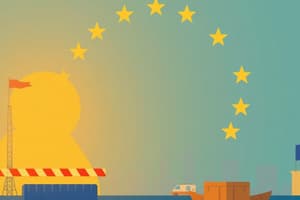Podcast
Questions and Answers
What is the significance of the European Union's trade policy in global trade governance?
What is the significance of the European Union's trade policy in global trade governance?
- It is primarily focused on bilateral agreements with developing countries.
- It is a relatively new area of cooperation within the Union.
- It has a minor impact on global economies due to the size of its market.
- It is a crucial interface between the EU's citizens and economic globalization. (correct)
What is the key feature of the Common Commercial Policy (CCP)?
What is the key feature of the Common Commercial Policy (CCP)?
- It is a bilateral trade policy framework.
- It is a centralized trade policy managed by the European Commission. (correct)
- It is a regulatory barrier to protect domestic industries.
- It is a multilateral trade agreement with developing countries.
What is the primary objective of the EU's 'Effective Multilateralism' strategy?
What is the primary objective of the EU's 'Effective Multilateralism' strategy?
- To increase trade barriers with developing countries.
- To promote economic growth through bilateral agreements.
- To protect domestic industries from unfair competition.
- To establish a rule-based international order. (correct)
What is the purpose of anti-dumping duties?
What is the purpose of anti-dumping duties?
What is the primary goal of the EU's trade policy?
What is the primary goal of the EU's trade policy?
What is a characteristic of the EU's trade policy?
What is a characteristic of the EU's trade policy?
What is an example of a unilateral policy initiative by the EU?
What is an example of a unilateral policy initiative by the EU?
What is a challenge facing the EU's trade policy?
What is a challenge facing the EU's trade policy?
What is the primary purpose of the EU's trade policy?
What is the primary purpose of the EU's trade policy?
What is the concept that the EU's market size gives it significant influence in international trade negotiations and global economic governance?
What is the concept that the EU's market size gives it significant influence in international trade negotiations and global economic governance?
What is a challenge faced by the EU in translating its trade policy into effective international influence?
What is a challenge faced by the EU in translating its trade policy into effective international influence?
What is the EU's ability to shape global norms and standards through its trade policy?
What is the EU's ability to shape global norms and standards through its trade policy?
What is the implication of the EU's trade policy for its role as a global actor?
What is the implication of the EU's trade policy for its role as a global actor?
What is necessary for the EU to be an effective global actor?
What is necessary for the EU to be an effective global actor?
What is the primary objective of the EU's trade policy?
What is the primary objective of the EU's trade policy?
What is the practical implication of the EU's trade policy for its member states and institutions?
What is the practical implication of the EU's trade policy for its member states and institutions?
Flashcards are hidden until you start studying
Study Notes
The European Union's Role in International Trade
- The EU plays a significant role in international trade and is a major player in global trade governance.
- The EU's large market size and its role as the world's largest importer and exporter of both goods and services make its trade policy influential in global economies.
Trade Policy Frameworks and Concepts
- The Common Commercial Policy (CCP) is a centralized trade policy managed by the European Commission, with decision-making involving the Council through a qualified majority.
- Effective Multilateralism is a core strategic objective of the EU, emphasizing the importance of strong international institutions and a rule-based international order.
Trade Policy Instruments
- Anti-dumping duties are imposed to protect domestic industries from unfair competition by foreign companies selling goods below fair market value.
- Regulatory Barriers are rules and standards that must be met by foreign producers to access the EU market.
- Unilateral Policies, such as the Everything But Arms (EBA), provide preferential market access to developing countries.
- Bilateral and Multilateral Agreements, such as the Lomé Convention, Cotonou Agreement, and Transatlantic Trade and Investment Partnership (TTIP), are used to promote trade.
Main Ideas and Key Findings
- The EU uses trade policy to promote economic growth, job creation, and competitiveness within Europe.
- There are tensions within the EU's trade policy, notably between liberal and protectionist stances, and between its commitment to multilateralism and actual compliance with international trade rules.
- The EU's trade policy is employed as a tool for foreign policy, including promoting good governance, human rights, and development in other countries.
Key Concepts
- Economic Power refers to the EU's ability to leverage its large market to influence global trade and project its values and interests internationally.
- Market Power Europe refers to the concept that the EU's market size gives it significant influence in international trade negotiations and global economic governance.
- Normative Power refers to the EU's ability to shape global norms and standards through its trade policy, promoting European values such as human rights and environmental protection.
Main Arguments
- The EU's trade policy is central to its role as a global actor, affecting not just economic outcomes but also political and social dynamics worldwide.
- Despite its economic strength, the EU faces challenges in translating its trade policy into effective international influence, often due to internal political dynamics and external resistance.
Conclusion and Practical Implications
- The EU's trade policy is a complex and multifaceted tool that serves multiple purposes, from economic growth to global governance.
- For the EU to be an effective global actor, it must address internal inconsistencies and improve its capacity to implement trade policies that genuinely reflect its commitment to multilateralism.
- The practical implications include the need for better coordination and coherence among EU member states and institutions, and a clearer articulation of the EU's trade policy objectives and strategies.
Studying That Suits You
Use AI to generate personalized quizzes and flashcards to suit your learning preferences.




